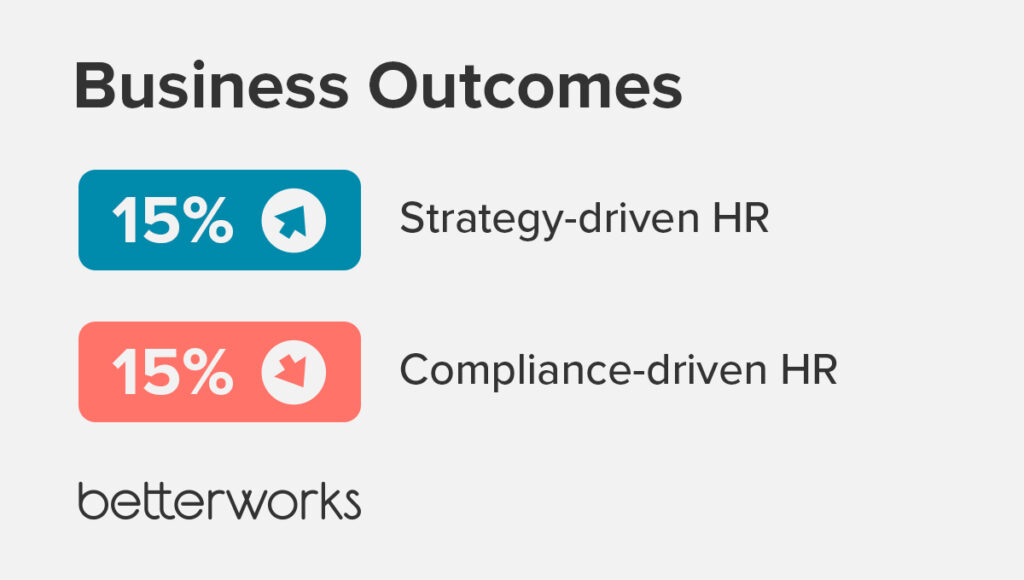HR leaders have assumed a bigger role in recent years, driving strategic business impact and helping employees deliver higher-quality work.
HR’s reputation in the C-suite is improving as a result. Half of business partners surveyed by Sapient Insights perceive HR as a strategic driver of business outcomes, said Stacey Harris during her session at the 2023 HR Tech Conference. Strategy-driven HR improves business outcomes by 15%, Harris said, while compliance-driven HR is associated with a 15% drop in business outcomes.
However, there’s still a lot of work to be done. As a strategic HR leader, what you focus your time, energy, and resources on matters. Learn about some of the top trends in strategic HR and how HR technology can help you address them.

Prioritization of employee experience
Employee experience is top of mind for strategic HR leaders, including areas such as improving employee wellness and overcoming workplace biases. People are holding companies and business leaders accountable for delivering healthier, more fulfilling work experiences.
HR leaders are adopting a holistic approach to supporting employee health and wellness, which includes removing obstacles to performance. When you understand what employees need to thrive, you better support them, whether that’s by streamlining their workloads or improving benefits packages.
Employees aren’t always able to express what they need, however. HR analytics technology can help fill the gaps. Analyzing the right data allows HR leaders to assess factors that signal employee burnout, for example, so you can intervene, said Visier Chief Customer Officer Paul Rubenstein, who was previously chief people officer.
Similarly, performance and promotion data can help you identify potential bias within your business. Data reflecting consistently poor performance by a certain demographic within a team could indicate bias by that team’s manager or poor workplace conditions that hinder their performance. Equipped with this data, you can act quickly to address bias and other gaps in employee experience.
Increased focus on manager effectiveness
Manager effectiveness is declining, said Stacia Garr of RedThread Research. That’s why HR leaders need to renew their support of managers, helping them provide better feedback and elevate team performance.
When HR departments collect, interpret, and share data, they help managers become more effective. Moving forward, HR leaders need to share relevant data with managers that helps them proactively shape performance rather than relying on backward-looking performance ratings, Rubenstein said.
Every organization is sitting on a gold mine of data, said Visier’s Ian Cook, but our tools and processes for getting the right data to the right people are lacking. Many organizations have consolidated data insights with top leadership but haven’t scaled those systems for managers. Others have invested in self-service solutions that give managers access to data but rarely translate numbers into actionable insights they can apply in the flow of work.
Rethink your HR tech stack with a stronger focus on people analytics. Doing so can help you strategically pull the right data points together and deliver them to managers in meaningful ways. Tools such as Betterworks’ Insights and Analytics present relevant, real-time performance data to managers to help them make better decisions and give better feedback in the moment — ultimately helping employees achieve more.
Seismic shifts in skills management
How HR leaders think about skills is rapidly evolving. We’re shifting from traditional job groups to a more dynamic approach to organizing employee skills.
Traditional career trajectories are linear and rigid, but people don’t naturally operate that way, said EY’s Antony Shields and Eightfold’s Conor Volpe. The future of skills management is to identify talent across the organization and have different skills for different scenarios to match business strategies.
HR technology plays a crucial role in addressing the trends discussed at the 2023 HR Tech Conference and other crucial issues. As HR leaders become increasingly strategic, they need to apply HR technology to drive positive business outcomes, improve employee experiences, and enable organizational success.
What strategic HR leadership looks like



